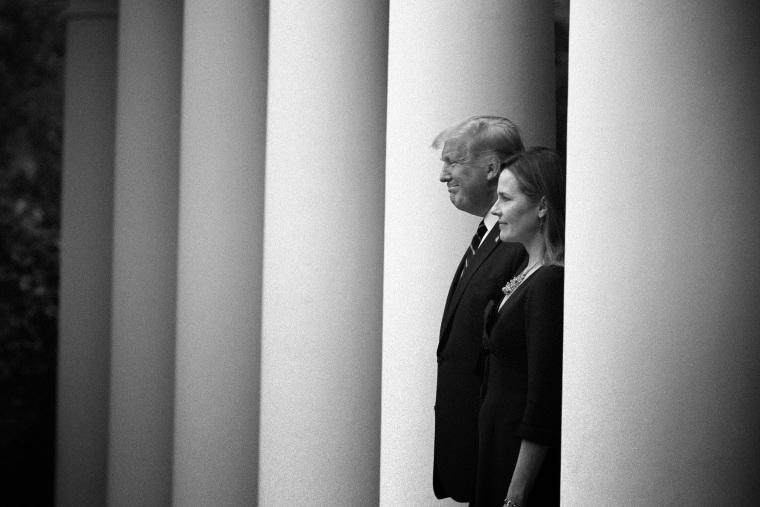WASHINGTON — Republicans appear to have the votes to confirm Judge Amy Coney Barrett and create the most conservative Supreme Court in nearly a century, one that could protect their priorities and hinder progressive goals for the next generation.
But for President Donald Trump and his party, hastily locking in that 6-3 conservative majority before the election may come at a price. Democrats, lacking procedural tools to block Barrett, have public opinion on their side and are focused on maximizing their political revenge.
In past elections, it was conservative activists who were more fired up by the desire to bend the court to their ideology. But now that it seems likely that a liberal icon, Justice Ruth Bader Ginsburg, will be replaced by a conservative who would unravel her legacy, liberals appear to have woken up.
A New York Times/Siena College poll out Sunday said 56 percent of likely voters nationally want the winner of the presidential race to pick the next justice, while 41 percent prefer that Trump fill the vacancy before the election. Likely voters in the battlegrounds of Michigan and Wisconsin each said by a 19-point margin that the winner should fill the vacancy, new NBC News/Marist polls found. Voters in Pennsylvania, Nevada and Ohio said they trust Joe Biden over Trump to pick the next justice, Fox News polls said.
Democrats rapidly coalesced Saturday evening, with unusual message discipline, around an issue that could milk that political advantage: Obamacare. It blends pocketbook concerns with life-and-death fears and carries urgency with a Trump-backed lawsuit that seeks to invalidate the law and faces a hearing at the Supreme Court one week after Election Day.
“Any vote to confirm this justice is a vote to eliminate health care for millions of Americans in the middle of a pandemic,” Sen. Brian Schatz, D-Hawaii, a member of the Democratic leadership team, told NBC News.
“Having failed in the Senate on a 51-49 vote, and having failed at SCOTUS on a 5-4 vote, Nov. 10 is their last best shot to take away people’s health care,” he said. “They are a party that is extremely enthusiastic about invalidating this law.”
Adding more fuel to the fire, Trump and Barrett each have a paper trail of criticizing Chief Justice John Roberts for upholding the Affordable Care Act individual mandate in 2012. If the current lawsuit succeeds, Obamacare and its protections for pre-existing conditions would be gone.
Biden, the vice president when the 2010 law was enacted, zeroed in on the issue. It was battle-tested in the 2018 midterm election when health care ranked as the top issue for voters and those who cited it favored Democratic candidates by 52 points, exit polls said.
The issue has haunted Trump and members of his party, who are caught between a core base that wants to unravel President Barack Obama's legacy and swing voters who support the law.
Republicans downplayed Barrett’s past writings on the ACA. One Senate GOP aide involved with the confirmation process stressed that it’s a “fool’s errand” to predict how judges would rule on a particular case, whether it involves Obamacare or the fate of abortion rights.
Barrett may be defenseless to refute the criticism, as doing so would be seen as improperly prejudging a case that could come before her and raise pressure for recusal.
GOP operatives moved quickly to galvanize their base around the nomination, with the party's Senate campaign arm quickly selling “Notorious A.C.B.” T-shirts — mimicking the “Notorious RBG” nickname that Ginsburg earned as she became a cultural icon.
Senate Republicans announced plans to begin hearings on Oct. 12. A final vote could take place at the end of the month, just days before Election Day on Nov. 3.
Adding Barrett would make this “the most conservative Supreme Court since the Lochner era,” said Erwin Chemerinsky, a professor at Berkeley Law in California, referring to a period in the early 20th century when laws regulating banks, minimum wages and child labor were decreed unconstitutional.
“The issues are different now, but if you look at where the justices are on the political spectrum, justices like Amy Coney Barrett and Clarence Thomas and Samuel Alito and Neil Gorsuch and Brett Kavanaugh are as far to the right for their society as any justices in American history have ever been,” he said.
“There will be five votes to overrule Roe v. Wade,” Chemerinsky said. “There may be five votes to strike down the Affordable Care Act. There will be at least five votes to allow employers and businesses to discriminate against gays and lesbians. I think there are going to be five votes to limit the ability of Congress to use the commerce power to adopt social legislation.”
In 2016, voters who cited Supreme Court appointments as the most important factor favored Trump over Hillary Clinton by 15 points, exit polls said. Republicans are hoping that a third Trump justice will energize enough conservative voters to push him over the top again.
“A Justice Amy Coney Barrett will ensure President Trump and Senate Republicans continue their transformation of the federal judiciary beyond 2020,” said Mike Davis, a former top lawyer for Senate Republicans on court nominations who now runs a group called the Article III Project to support Trump's judges.
If the Republican gamble fails, the party could have a 6-3 Supreme Court to obstruct a President Joe Biden’s agenda.

